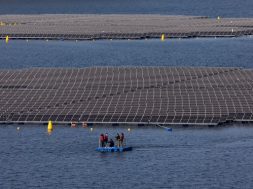
In Short : “Under the new RE Park Scheme, floating solar projects could qualify for subsidies, signaling a push towards innovative renewable energy solutions and encouraging the adoption of floating solar technology.”
In Detail : New Delhi : The Indian government is planning to bolster its promotion of floating solar projects under a new Renewable Energy (RE) park scheme in the works, sources revealed.
Floating solar panels installed on water bodies like lakes and reservoirs could receive additional subsidies to drive their adoption, reported Mint.
“A revamped RE park policy is being drafted which aims to support floating solar parks through subsidies,” a government official familiar with the matter stated. This marks a shift fr0m earlier considerations of viability gap funding for such projects.
Renewable energy parks are designated zones integrating diverse clean power sources like solar and wind alongside infrastructure like land, transmission lines, roads and water supply. The upcoming scheme prioritises hosting solar and wind farms within common park areas.
In line with India’s existing solar park program providing subsidies, the new policy would extend financial assistance specifically for floating solar installations. Under the current scheme, the government grants up to Rs 25 lakh for solar park development reports and Rs 20 lakh per MW or 30 per cent of project costs upon achieving milestones.
“Over and above such general incentives for RE parks, the plan is to provide higher subsidised support for floating solar projects,” the official added. The move aims to catalyse growth in this space.
Floating solar evades land constraints while minimising water evaporation losses. However, the higher capital costs have restricted large-scale deployment so far. While India’s floating solar potential is estimated at 280-300 GW, only a fraction has been tapped across select states.
As India targets achieving 500 GW of non-fossil installed capacity by 2030, with 292 GW fr0m solar, policy tailwinds for floating solar parks could accelerate their proliferation in the country’s energy transition.










